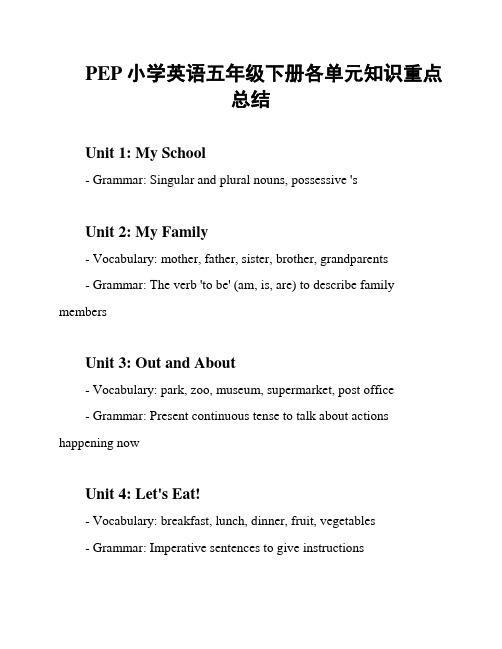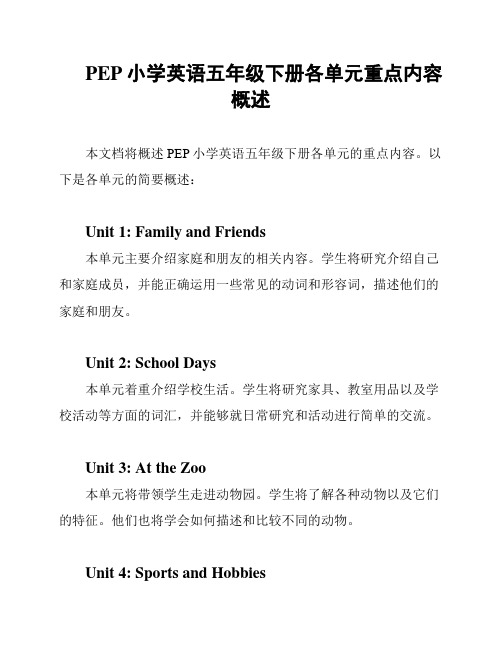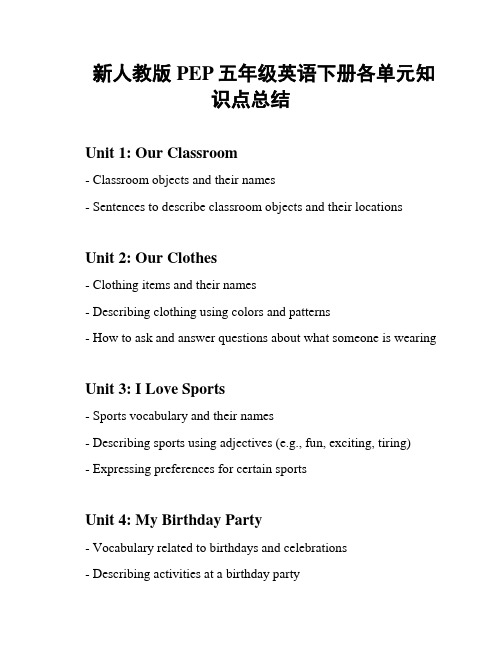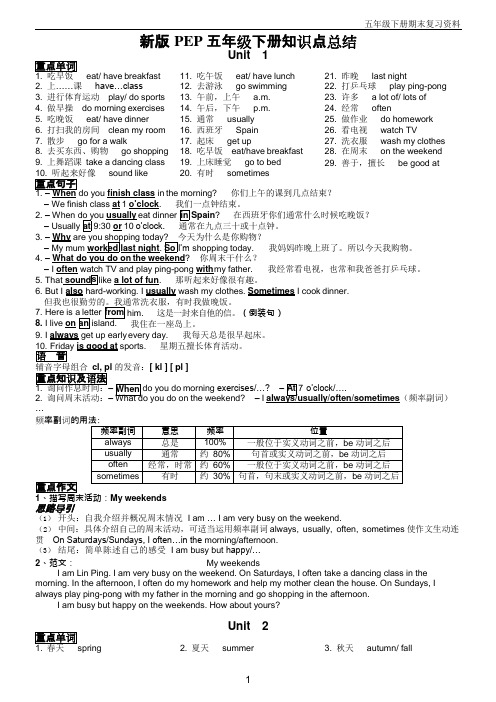(完整版)新版PEP五年级英语下册各单元知识点
PEP五年级英语下册Unit1-6重点知识小结

Unit 1 This Is My Daydo morning exercises晨练eat breakfast吃早饭have english class上英语课play sports进行体育运动eat dinner吃晚饭when什么时候evening夜晚;晚上get up起床at在……点钟usually通常;一般noon中午climb mountains爬山go shopping购物;买东西play the piano弹钢琴visit grandparents看望祖父母go hiking去远足weekend周末often经常sometimes有时候话题1:日常生活时态:一般现在时1.When do you do morning exercises? 你什么时候做早操?I usually do morning exercises at 8:00. 我经常八点钟做早操。
(I usually get up at 12:00 at noon . 我经常在中午十二点起床。
) 2.When do you eat dinner ? 你什么时候吃晚餐?I eat dinner at 7:00 in the evening. 我在晚上七点种吃晚餐。
3.When is the best time to go to Beijing? Fall. 最好在什么时候去北京?秋天。
Unit 2 My Favourite Seasonspring春天summer夏天fall秋天winter冬天season季节which哪一个best最;极swim游泳fly kites放风筝skate滑冰make a snowman堆雪人plant trees种树why为什么because因为sleep 睡觉话题2:季节时态:一般现在时1.Which season do you like best ? I like spring best.(Spring.)你最喜欢是什么季节?我最喜欢春季。
PEP小学英语五年级下册各单元知识重点总结

PEP小学英语五年级下册各单元知识重点总结Unit 1: My School- Grammar: Singular and plural nouns, possessive 'sUnit 2: My Family- Vocabulary: mother, father, sister, brother, grandparents- Grammar: The verb 'to be' (am, is, are) to describe family membersUnit 3: Out and About- Vocabulary: park, zoo, museum, supermarket, post office- Grammar: Present continuous tense to talk about actions happening nowUnit 4: Let's Eat!- Vocabulary: breakfast, lunch, dinner, fruit, vegetables- Grammar: Imperative sentences to give instructionsUnit 5: At the Farm- Vocabulary: farmer, barn, cow, pig, chicken- Grammar: There is/There are to talk about existenceUnit 6: Our Town- Vocabulary: street, hospital, police station, fire station, city- Grammar: Prepositions of place (in, on, under, behind, next to)Unit 7: Weather Report- Vocabulary: sunny, cloudy, rainy, snowy, windy- Grammar: Adjectives to describe weatherUnit 8: Fun with Friends- Vocabulary: play, sing, dance, swim, draw- Grammar: Simple present tense to talk about daily activitiesUnit 9: In the Ocean- Vocabulary: fish, dolphin, shark, octopus, seahorse- Grammar: Wh- questions using 'What' and 'Where'Unit 10: Happy Holidays- Vocabulary: Christmas, Easter, Halloween, New Year's Day, Thanksgiving- Grammar: Use of can for ability。
新人教版PEP 【小学五年级英语下册】 单元知识点 归纳总结

新人教版PEP 【小学五年级英语下册】单元知识点归纳总结Unit 1 My DayIn this unit。
we learn some core vocabulary words。
phrases。
and XXX.Core Vocabulary:1.Verbs: take (studying)。
go to (class)2.Nouns: dancing。
exercise。
sports3.Phrases: do morning exercises。
eat breakfast。
play sports。
eat dinner。
go for a walk。
go shopping。
clean my room。
take a dancing class。
have a classXXX Vocabulary:1.Verbs: start。
shop。
work。
need。
live。
win。
sound2.Nouns: Spain。
play。
letter。
island。
cave3.ns: after4.XXX: when。
XXX。
a.m。
p.m。
why。
last。
also。
busy5.nal Vocabulary: frequency adverbs (always。
usually。
sometimes)Phrases:watch TV。
eat lunch。
go to bed。
go swimming。
go home。
go to schoolCore Sentence Structure:When do you do morning exercises?" "At 7 o'clock."XXX phrase is "good job" to praise XXX.Which season do you like best。
I like winter best。
This sentence means "which one do you like the most" and "like。
PEP小学英语五年级下册各单元重点内容概述

PEP小学英语五年级下册各单元重点内容概述本文档将概述PEP小学英语五年级下册各单元的重点内容。
以下是各单元的简要概述:Unit 1: Family and Friends本单元主要介绍家庭和朋友的相关内容。
学生将研究介绍自己和家庭成员,并能正确运用一些常见的动词和形容词,描述他们的家庭和朋友。
Unit 2: School Days本单元着重介绍学校生活。
学生将研究家具、教室用品以及学校活动等方面的词汇,并能够就日常研究和活动进行简单的交流。
Unit 3: At the Zoo本单元将带领学生走进动物园。
学生将了解各种动物以及它们的特征。
他们也将学会如何描述和比较不同的动物。
Unit 4: Sports and Hobbies本单元将探讨体育和爱好。
学生将研究描述不同体育运动和爱好的词汇,并能够就自己的喜好进行表达。
Unit 5: Food and Health本单元将关注食物和健康。
学生将研究各种食物的名称和描述,同时也会探讨健康和饮食惯的重要性。
Unit 6: My Neighborhood本单元将介绍学生所在的社区。
学生将研究描述自己的住所和周围环境的词汇,并能够就不同位置进行简单的指示。
Unit 7: Weather and Seasons本单元将涉及天气和季节。
学生将研究各种天气状况的词汇和描述,并了解不同季节的特点。
Unit 8: Holidays and Festivals本单元将介绍各种假期和节日。
学生将研究诸如春节、圣诞节等节日的名称和庆祝活动,并能够就个人喜好进行交流。
Unit 9: On the Farm本单元将带领学生了解农场。
学生将研究农场里各种动物和农作物的名称,并能够描述它们的特点。
Unit 10: Travel and Adventure本单元将聚焦旅行和冒险。
学生将研究描述不同交通工具以及旅行地点的词汇,并能够描述自己的旅行经历。
以上是PEP小学英语五年级下册各单元的重点内容概述。
新人教版PEP五年级英语下册各单元知识点总结

新人教版PEP五年级英语下册各单元知识点总结Unit 1: Our Classroom- Classroom objects and their names- Sentences to describe classroom objects and their locationsUnit 2: Our Clothes- Clothing items and their names- Describing clothing using colors and patterns- How to ask and answer questions about what someone is wearingUnit 3: I Love Sports- Sports vocabulary and their names- Describing sports using adjectives (e.g., fun, exciting, tiring)- Expressing preferences for certain sportsUnit 4: My Birthday Party- Vocabulary related to birthdays and celebrations- Describing activities at a birthday party- Expressing likes and dislikes about different party elementsUnit 5: At the Farm- Vocabulary related to farm animals and their names- Describing farm animals using adjectives (e.g., big, small, noisy) - Describing activities at a farm (e.g., feeding animals, milking cows)Unit 6: A Fun Day Out- Vocabulary related to amusement park rides and activities- Describing activities and experiences at an amusement park- Expressing likes and dislikes about different rides and activitiesUnit 7: A Friendly Letter- Vocabulary related to writing a letter (e.g., greeting, closing, signature)- Structure of a friendly letter- Writing a letter to a friend, describing personal experiences or activitiesUnit 8: Our Pets- Vocabulary related to pets and their names- Describing pets using adjectives (e.g., cute, friendly, playful)- Talking about responsibilities and caring for petsUnit 9: Our Earth- Vocabulary related to the environment and nature- Describing different natural elements (e.g., mountains, rivers, plants)- Expressing concerns and suggesting actions to protect the environmentUnit 10: Fun with Art- Vocabulary related to art and artistic activities- Describing different art forms (e.g., drawing, painting, sculpting) - Talking about personal preferences for different art activitiesUnit 11: Let's Travel- Vocabulary related to travel and transportation- Describing different modes of transportation (e.g., car, train, airplane)- Talking about travel experiences and preferences for different destinationsUnit 12: Healthy Habits- Vocabulary related to health and healthy habits- Describing different healthy habits (e.g., exercise, balanced diet, enough sleep)- Talking about personal choices and habits for a healthy lifestyle。
(完整)PEP小学英语五年级下册各单元知识重点归纳-推荐文档

PEP五年级下册各单元知识重点Unit 1 This Is My Day我会背:do morning exercises晨练eat breakfast吃早饭have english class上英语课play sports进行体育运动eat dinner吃晚饭when什么时候evening夜晚;晚上get up起床at在……点钟usually通常;一般noon中午climb mountains爬山go shopping购物;买东西play the piano弹钢琴visit grandparents看望祖父母go hiking去远足weekend周末often经常sometimes有时候话题: 日常生活1. When do you do morning exercises? 你什么时候做早操?.usuall.d.mornin.exercise.a.8:00......我经常八点钟做早操。
(.usuall.ge.u.a.12:0.noo........我经常在中午十二点起床。
)2. When do you eat dinner ? 你什么时候吃晚餐?.ea.dinne.a.7:0.i.th.evening........我在晚上七点钟吃晚餐。
3.Wha.d.yo.d.o.th.weeken......... 你周末做什么?.usuall.clim.mountains. 我通常去爬山. .ofte.pla.sport..我经常经行体育锻炼。
Sometime..pla.th.pian..有时候我弹钢琴。
Unit 2 My Favourite Season我会背:spring春天summer夏天fall秋天winter冬天season季节which哪一个best最;极swim游泳fly kites放风筝skate滑冰make a snowman堆雪人plant trees种树why为什么because因为sleep睡觉favourite 最喜爱的话题: 季节1. Which season do you like best ? I like spring best.(Spring.)你最喜欢是什么季节?我最喜欢春季。
完整版)人教版PEP五年级英语下册各单元知识点

完整版)人教版PEP五年级英语下册各单元知识点Unit 1 My DayIn this unit。
we will focus on the following vocabulary words:1.Four-word phrases:XXXHave classPlay sportsExerciseMorning exercisesEat XXXClean my roomGo for a walkGo shoppingXXXDancingTake a dancing class2.Three-word phrases: WhenAfterStartUsuallySpainLateAMPMWhyShopWorkLastSoundAlsoBusyNeedPlayXXXLiveIslandAlwaysCaveGo swimmingXXXXXX words。
we will also cover other daily XXX up。
eating lunch。
and going to bed。
We will also learn how to wash our face and clothes。
watch TV。
play ping-pong and the pipa。
go swimming and running。
do homework and kung fu。
and play XXX.We will also learn about frequency adverbs。
including always。
usually。
often。
and sometimes。
Finally。
we will cover the n words when and why。
and XXX we do certain activities.One XXX structure we will learn is how to ask someone when they do something and how to answer。
(完整版)新版PEP五年级下册知识点总结,推荐文档

in at When 新版 PEP 五年级下册知识点总结Unit 11. 吃早饭 eat/ have breakfast2. 上……课 have…class3. 进行体育运动 play/ do sports4. 做早操 do morning exercises5. 吃晚饭 eat/ have dinner6. 打扫我的房间 clean my room7. 散步 go for a walk8. 去买东西、购物 go shopping 9. 上舞蹈课 take a dancing class 10. 听起来好像 sound like11. 吃午饭 eat/ have lunch 12. 去游泳 go swimming 13. 午前,上午 a.m. 14. 午后,下午 p.m. 15. 通常 usually 16. 西班牙 Spain 17. 起床 get up18. 吃早饭 eat/have breakfast 19. 上床睡觉 go to bed 20. 有时 sometimes21. 昨晚 last night22. 打乒乓球 play ping-pong 23. 许多 a lot of/ lots of 24. 经常 often25. 做作业 do homework 26. 看电视 watch TV27. 洗衣服 wash my clothes 28. 在周末 on the weekend 29. 善于,擅长 be good at1. – When do you finish class in the morning? 你们上午的课到几点结束? – We finish class at 1 o’clock . 我们一点钟结束。
2. – When do you usually eat dinner Spain ? 在西班牙你们通常什么时候吃晚饭? – Usually 9:30 or 10 o’clock. 通常在九点三十或十点钟。
- 1、下载文档前请自行甄别文档内容的完整性,平台不提供额外的编辑、内容补充、找答案等附加服务。
- 2、"仅部分预览"的文档,不可在线预览部分如存在完整性等问题,可反馈申请退款(可完整预览的文档不适用该条件!)。
- 3、如文档侵犯您的权益,请联系客服反馈,我们会尽快为您处理(人工客服工作时间:9:00-18:30)。
PEP五年级英语下册各单元知识点一. 频度副词。
always总是,一直(100%)usually通常(80%)often 经常(60%)sometimes有时(30%)二. 重点句型。
1. 询问别人什么时候做某事的句型及回答。
句型结构:问:When do you+动词短语原形+其他?(你/你们什么时候做某事?)答:I/We(+频度副词)+动词短语原形+at+具体时间(我/我们通常在几点做某事。
)例:问:When do you go to bed?(你什么时候上床睡觉?)答:I go to bed at 9:00p.m (我晚上9点上床睡觉。
)注意:当主语是第三人称单数(he,she,it,单个人名或单数名词)时,助动词do要变成does, 句型结构是:When does+主语(第三人称单数)+动词短语原形+其他?2. 询问别人周末做什么的句型及回答。
句型结构:问:What do you do on the weekend?(你周末做什么?)答:I(+频度副词)+动词(短语)+其他。
例:问:What do you do on the weekend?(你周末做什么?)答:I usually read books. (我通常看书。
)注意:当主语是第三人称单数(he,she,it,单个人名或单数名词)时,助动词do要变成does,句型结构是:What does+主语(第三人称单数)+do+on the weekend?三.句型转换:1.肯定句↔一般疑问句:I usually get up at 6:00. ↔ Do you usually get up at 6:00?肯定回答:Yes, I do. 否定回答:No, I don’t.(第三人称时) He eats dinner at 6:00p.m. ↔ Does he eat dinner at 6:00p.m.?2.肯定句↔否定句:I like playing the piano. ↔ I don’t like playing the piano.I can play the piano. ↔ I can’t play the piano.3.划线提问:⑴I often go shopping on the weekend. →When do you go shopping ?⑵I often go shopping on the weekend. →What do you do on the weekend?⑶I go to school at 7:00. →When do you go to school?四. 四会句子:When do you finish class in the morning ? 你们上午的课到几点结束?We finish class at 1 o’clock . 我们一点钟结束上午的课。
What do you do on the weekend ? 你周末做什么?I often watch TV and play ping-pong with my father .我经常看电视,也常和我爸一起打乒乓球。
五. 语音:cl /kl/ clean clock class clever pl /pl / plate eggplant please play一. 重点句型1. 询问别人天气怎么样的句型及回答。
句型结构:问:What’s the weather like+时间+地点?(······天气怎么样?)答:It’s+表示天气的形容词例:问:What’s the weather like in winter in Beijing?(北京冬天的天气怎么样)答:It’s cold and windy.(有风而且寒冷。
)2. 询问别人最喜欢的季节句型及回答。
句型结构:问:Which season do you like best? (你最喜欢的季节是哪一个?)答:I like+季节+best或直接说季节名称。
同义句还有:What’s your favourite season?3. 询问别人喜欢某个季节的原因的句型及回答。
句型结构:问:Why do you like+季节名称?或直接用“Why”来提问。
答:一般要用“because”引导的句子来说明理由,可以从天气相关的活动等方面来说。
例:问:Why do you like spring?(你为什么喜欢春天?)答:Because I can fly kites.(因为我能放风筝。
)问:Why do you like summer?(你为什么喜欢夏天?)答:Because I can go swimming everyday.(因为我每天都能去游泳。
)问:Why do you like autumn?(你为什么喜欢秋天?)答:Because the weather is cool.(因为天气凉爽。
)问:Why do you like winter?(你为什么喜欢冬天?)答:Because I can make a snowman.(因为我能堆雪人。
)二. 四会句子:Which season do you like best , Mike ? 迈克,你最喜欢哪个季节?Winter . 冬天。
Why ?为什么?Because I like summer vacation ! 因为我喜欢暑假!三. 句型转换:1. 肯定句↔一般疑问句:⑴I like summer. ↔ Do you like summer?肯定回答:Yes, I do. 否定回答:No, I don’t.⑵It is sunny and hot. ↔ Is it sunny and hot?肯定回答:Yes, it is. 否定回答:No, it isn’t.⑶The sky is very blue. ↔ Is the sky very blue?The leaves are colourful. →Are the leaves colourful?2. 划线提问:⑴I like summer best. →Which season do you like best?⑵My favourite season is winter. →What is your favourite season?⑶It is sunny in May in Beijing. →What is the weather like in May in Beijing?⑷I’d like to swim. →What would you like to do?四.语音:br /br/ brown library brother umbrellagr /gr/ green grapes grandpa grow一、注意:1. 月份的首字母一定要大写。
2. May,June, July没有缩写形式,September的缩写形式是“Sept.”,其他月份单词的缩写形式都是有单词的前三个字母加“·”构成。
3. 月份的缩写形式不用在句子中,只能单独使用。
4. 表示“在几月”时,要在月份单词前面加介词in, 但在几月几日用on。
二. 活动名称sports meet 运动会Easter party 复活节聚会school trip 学校旅行Chinese test 语文测试singing contest歌咏比赛birthday party生日聚会三. 介词in . on. at的用法。
1. in后面+上午/下午/晚上/月份/季节/年份。
如:in the morning, in April, in winter, in 2015.2. on的后面+具体的某一天。
如:on Monday, on April 3rd, on Friday morning.3. at后面+具体的时间点或与其他词构成固定搭配。
如:at six o’clock, at 12:30 at noon.四. 重点句型。
1. 问答某个活动或节日在几月份的句型及回答。
句型结构:问:When is+活动或节日名称?答:It’s in+月份。
例:问:When is Christmas?(圣诞节在什么时候?)答:It’s in December.(在十二月。
)2. 询问别人将要做什么的句型及回答。
句型结构:问:What will you do+其他?答:I will····=I’ll···例:问:W hat will you do for your mum on Mother’s Day?(母亲节你将为你妈妈做什么?)答:I’ll give her some flowers.(我将送给她一些花。
)3. 表达“我们将要···”的句型。
We’ll···=We will 后面+动词原形,这是一个一般将来时的句子,表示将来某个时间要发生的动作或事情。
例:We’ll have a school trip.(我们将有一次学校旅行。
)We’ll have a sin ging contest.(我们将有一次歌咏比赛。
)We’ll take a dancing class.(我们将要上一节舞蹈课。
)五.句型转换:⒈肯定句→一般疑问句:①把be动词(am/is/are)调到句首:第一、二人称:My birthday is in June. ↔ Is your birthday in June?第三人称:John’s birthday is May 1st. ↔ Is John’s birthday May 1st?(这里主要讲的是生日,因此回答一律用it 来回答:Yes, it is. / No, it isn’t. )⒉肯定句↔否定句:在be动词(am/is/are)后+ not:His birthday is in January ↔ His birthday isn’t in January ( is not = isn’t )⒊划线提问:My birthday is in February. →When is your birthday?Amy’s birthday is Apr. 9th. →Whose birthday is Apr. 9th ?The Children’s Day is June 1st . →When is the Children’s Day?六.四会句子:When is the party ? 聚会什么时候举行?It’s in April . 在4月。
